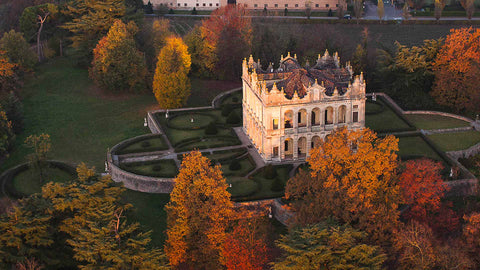
Decanus | Abbazia di Praglia
DENOMINATION: Colli Euganei DOC Riserva
GRAPES: 80% Merlot, 20% Cabernet Sauvignon
TYPE: red
PROVENANCE: Veneto, Italy
AGEING POTENTIAL: 5-6 years
SERVING TEMPERATURE: 18-20° C
GLASS: large wine glass
ALCOHOL: 13,5% vol
FORMAT: 75 cl
THE WINE
TECHNICAL SPECIFICS
FRESHNESS: ◼︎◼︎◼︎◻︎◻︎
BODY: ◼︎◼︎◼︎◼︎◻︎
SAPIDITY: ◼︎◼︎◼︎◻︎◻︎
SOFTNESS: ◼︎◼︎◼︎◻︎◻︎
TANNIN:◼︎◼︎◼︎◻︎◻︎
NOTES BY OUR SOMMELIERS
👁Intense ruby red;
👃🏻 it has a fragrant and very elegant bouquet of red fruits (among all cherries), undergrowth and spices;
👄 on the palate the tannin is smooth, for a full-bodied, warm red with fruit in the foreground. The balsamic note makes the drink intriguing. Very pleasant.
FOOD PAIRINGS
Intense red that pairs perfectly with red meat dishes and stewed or grilled game. It should be opened half an hour before the service.
WINE-MAKING AND REFINEMENT
In the Euganean Hills Merlot is at home, and together with the Cabernet Sauvignon with which it ages for a long time in wooden barrels it creates a red with character. Just 4000 bottles produced.
YOU'LL LOVE IT FOR...
its personality.
ORIGIN
TERROIR
The company is located in Veneto, at the foot of the Euganean Hills. In the region, the presence of mountain ranges and the vast portion of the plain offers considerable temperature variations between summer and winter, mitigated near Lake Garda and in the coastal area. Veneto is the first region of Italy for wine production; it is also very rich in native vines, including garganega, trebbiano di Soave, white-berried prosecco (or glera), corvina, rondinella, molinara and raboso and the semi-unknown black-berried turkish. Among the non-native vines, some have found the perfect terroir among the Euganean Hills: among them Merlot and Cabernet Sauvignon.
From the point of view of the soils, Veneto has territories characterized by alluvial and above all volcanic soils, which allows the production of wines of many types, from light and drinkable ones, to full-bodied and important wines.
Specifically for the wines of the Euganean Hills, these were well known since ancient times, mentioned by Martial in the first century after Christ, who wrote of the "Euganean districts with painted and quilted vine bumps". Currently there are about 2500 hectares of vineyards registered with the Colli Euganei DOC appellation.
WINERY
The Praglia Abbey stands at the foot of the Euganean Hills, about 12 kilometers from Padua, along the ancient road that led to Este. Founded between the 11th and 12th centuries, it remained a dependency of the Abbey of S. Benedetto in Polirone in Mantua until 1304.The Abbey experienced a flourishing period until the Napoleonic suppression of 1810. In 1834, thanks to the support of the Austrian government, the monks returned to the monastery.
The resumption of Benedictine life in Praglia, however, was short-lived since on June 4, 1867, the law that once again suppressed all religious corporations was passed in Veneto. The community was thus dissolved. Most of it found refuge in the monastery of Daila (Istria), then in Austrian territory and in Praglia only two or three monks remained, as custodians of the monastery. On April 26, 1904, the first two monks returned to the monastery and on the following October 23 the life of the Abbey was able to resume regularly, continuing to this day.
Vines and wine have always been grown in Praglia. Today's production was restarted in the 2000s. The vineyard is small and well-kept, with an approach of minimal intervention in the vineyard and in the cellar, and very respectful practices also dictated by the fact that, in addition to wine, the friars raise bees, which they need a perfectly healthy ecosystem.
The wines of the abbey are aged in an ancient barrel cellar, obtained at the lowest point, in the heart of the monastery. In addition to the production of reds, the friars are concentrating on refining the Classic Method, with very long and patient stops on the yeasts.


When will I receive my order?
If the bottle is in stock it will be sent immediately and you will receive it in a couple of working days.
Is the order renewed?
No, this product is not bound by any type of subscription and cannot be renewed.
Is there a minimum number of bottles?
No, you do not have to order a minimum quantity of bottles: you can choose to receive just one bottle of each type.

This product has no reviews yet.
